El Centro de la Raza is sponsoring a lecture series focusing on indigenous cultures in Central and South America that begins tonight in the center's Mesa Vista Hall conference room.
Undergraduate student Louie Garc°a organized the event titled, "Noches de Cultura Platica Series: Raices Indigenas," which translates from Spanish to "Nights of Culture Speaker Series: Indigenous Roots."
Garc°a says his goal was to develop lectures that exposed the UNM community to conversations about indigenous people and social movements that went beyond political action already familiar to people at the University.
"This is not necessarily just about Zapatistas or the whole political thing that everyone talks about," he said. "The other half is the culture that provides the base from which all these movements are springing forward. My goal was to bring all of these things together and really get into discussions about women's issues, feminism, identity issues and indigenous rights."
The first lecture in the series, which will be delivered by Garc°a tonight from 6-8 p.m., is titled "Mayan Culture of Chiapas." He said he decided to address the Zapatista movement because it gained notoriety but hasn't really been fully understood.
The indigenous group has been fighting to secure land and human rights in Mexico's most southern state. Its enigmatic masked leader, Subcomandante Marcos, led the group's declaration of independence from the country.
Get content from The Daily Lobo delivered to your inbox
Marcos has become a post-modern revolutionary hero who has earned international support for the Zapatista movement.
Garc°a traveled to Chiapas during winter break to work as a volunteer and interpreter for First Nations North and South, which strives to build solidarity among indigenous people fighting for human and land rights.
"I had heard a lot about the Zapatistas, but I still wanted to know what makes them so strong in their struggle and movement and what drives them," he said. "I wanted to know how they have gotten this far. I had my own ideas and investigated it while I was there."
During his visit, Garc°a discovered that the group's culture is what unified the Zapatistas.
"I found out that their indigenous identity is strong and they have a really strong connection to their Mayan ancestry," he said. "I got to know and understand that the strength is in their culture, tradition and language. I appreciated their traditional fiestas and forms of weaving. I could totally relate to the weaving because that is something I do. Now I can share all of that with others."
The series continues Feb. 20 with a presentation by Andrea Quijada, an art history graduate student. Her lecture is titled "Aztec Culture of Mexico."
Quijada will be discussing her master's thesis, "Coatlicue: Constructs of Chicana Feminism." The thesis examines the use of Coatlicue as a mother figure in Aztec cosmology. Coatlicue is a figure whose importance extended to early 20th century Mexican art, indigenous movements and is a central icon in Chicana visual and literary arts.
The final lecture, "Quichua Culture of Ecuador," will be delivered by Naomi Gabriela Maita Schwartz and Dr. Salvador Maita Schwartz Feb. 27.
She is a performer of northern Andes traditional music and dance who has been living in Ecuador for 10 years and teaching Quicha, English and Spanish. She is now a doctoral student in UNM's Latin American and Iberian Institute. Her lecture will center on Andean cultural traditions and indigenous identity.
Dr. Salvador Mait Schwartz has a degree in general medicine and surgery. He is from Saraguro, Ecuador, which is in Southern Ecuador near the Peruvian border. His lecture will focus on indigenous movements in Ecuador he has worked with.
All lectures are from 6-8 p.m. in the El Centro de la Raza conference room. For more information, call 277-5020 or go to www.unm.edu/~elcentro.





